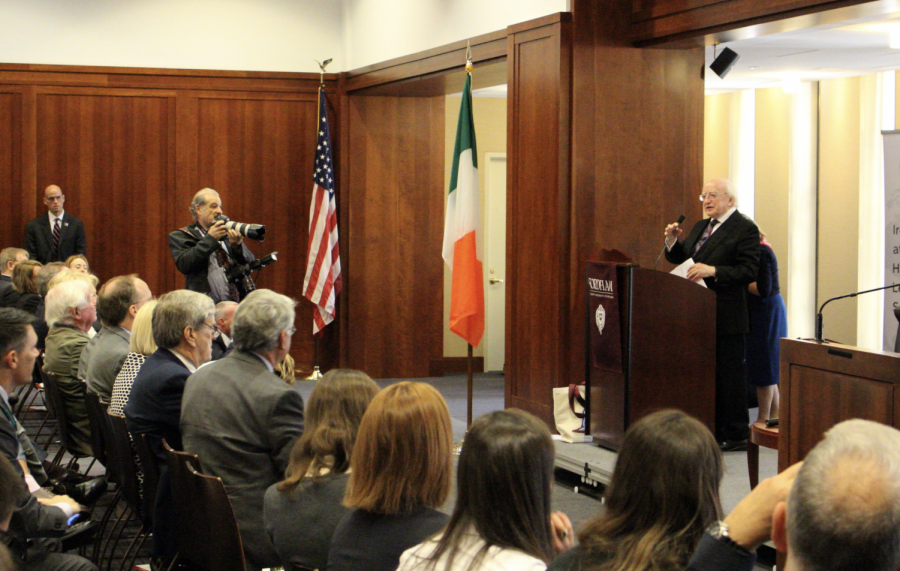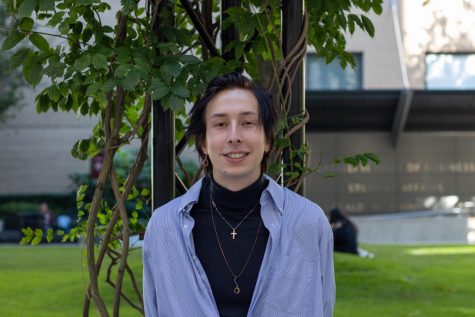The President of Ireland Visits Fordham University
JOE KOTTKE/THE OBSERVER
Michael Higgins speaks to a sold-out crowd at FCLC. On a highly publicized visit to New York City, he also appeared at the UN and on Jimmy Kimmel.
October 2, 2019
On Sept. 30, 2019, Fordham Lincoln Center welcomed President of the Republic of Ireland Michael D. Higgins to speak on campus as part of the “Fordham Humanitarian Lecture Series” hosted by the school’s Institute of International Humanitarian Affairs (IIHA).
Fordham University President Rev. Joseph M. McShane, S.J., who often refers to his own Irish Catholic heritage, introduced Higgins as an “eloquent, compassionate and thoughtful leader.”
Higgins’ remarks focused on the more than 71 million people forcibly displaced around the world due to violent conflict and resource scarcity. Higgins is one of several speakers invited by the IIHA to speak on the world refugee crisis in recent years, and encouraged students to work towards solutions for the world’s refugee population, which is currently at an all-time high.
“We turn to universities in desperation in the midst of an ecological, social, economic and ethical crisis,” said Higgins. “There is no place like a university for reflection and enrichment. It’s a gathering place for the young and curious who believe that the world can indeed be changed.”
Higgins, who was a poet, professor and author before becoming a president, presented his perspective on the international crisis and how he believes countries around the world should respond. His speech came amid the United Nations General Assembly earlier in September, where the refugee crisis was discussed among a slate of other global issues.
Since 1998 that Higgins said, he has worked on resettling portions of the world’s refugee populations in Ireland. It was under his presidency that the Irish Refugee Protection Programme was formed, which has been characterized as a direct humanitarian aid response to the massive influx of Syrian refugees to Europe in the mid-decade.
“He is a champion of the arts and not only a humanitarian, but a humanist,” said McShane.
Higgins has used both his national and global platform to promote protection of refugees who are fleeing places where he feels that “all hope has been lost.”
“It is my responsibility as president of Ireland to encourage Irish citizens at home and abroad to be exemplary in reaching out to those who are seeking shelter,” said Higgins.
Higgins was the first recipient of the Seán MacBride Peace Prize in Helsinki, Finland, in recognition of his work for building peace and justice.
Much of Higgins’ argument focused on the intersectional relationship between the global climate and the factors that drive both war and migration.
“Dangerous shifts in climate are placing stress on communities where ecosystems can no longer support populations, leading to a lack of resources and contributing to violence,” said Higgins. “Unless we collectively take action to prevent catastrophic climate change, these population flows driven by climate shifts will only increase. They are increasing.”
Higgins also spoke to the intergovernmental relations that often hinder, rather than help, the growing refugee crisis.
According to Higgins, roughly 80% of refugees only make it as far as neighboring countries, which often lack the resources to accommodate such large population increases. Higgins noted that this often comes without much acknowledgment or respect by more developed countries, like Ireland and the United States. He argued that it was the responsibility of both the U.S. and Ireland to stand in international solidarity with refugees, particularly as Western democracies become more hostile to refugee and migrant populations.
“Neo-nationalism does not speak of freedom,” said Higgins. “It speaks of fear and exclusion.”
“I believe we can not and must not remain silent in the face of such attacks on refugees and migrants. We are all on a shared planet,” said Higgins.
According to McShane, three-fourths of the previous presidents of Fordham University have had Irish ancestry — including himself. Standing in solidarity with Higgins’ messages, he said, “We are a university founded by and for immigrants. If we fail to embrace them, we fail the ability to maintain the soul of the university and its sacred mission. We are great because of immigrants not in spite of them. How we treat our brothers and sisters is of the highest importance.”
After the presentation, McShane said, “It was spectacular, moving, philosophical, poetic and a call to action; in short, it was Irish.”
Gabe Samandi contributed additional reporting to this story.











